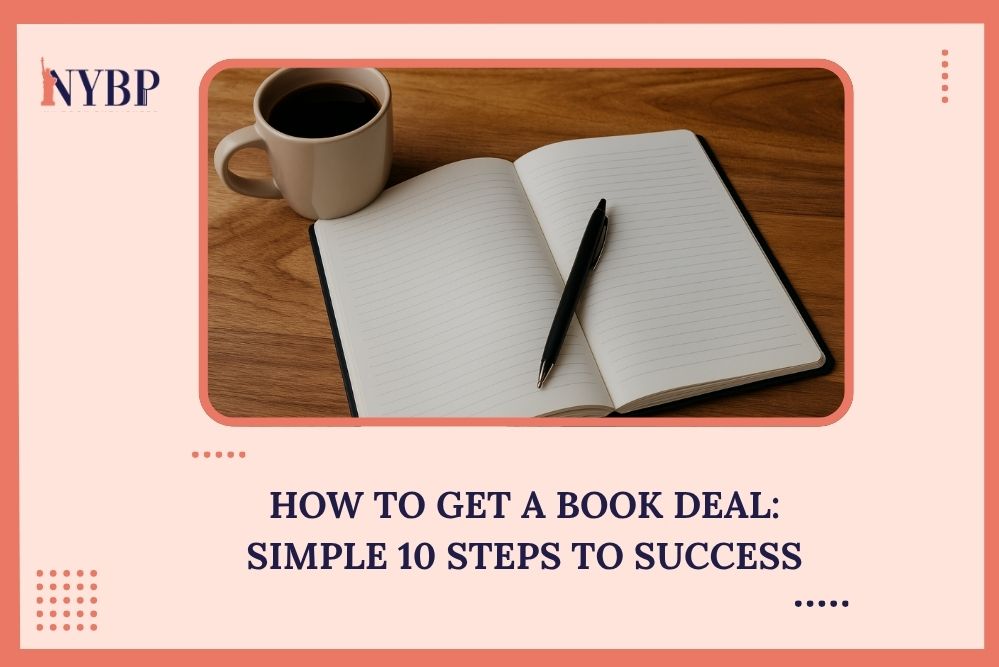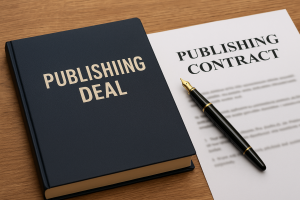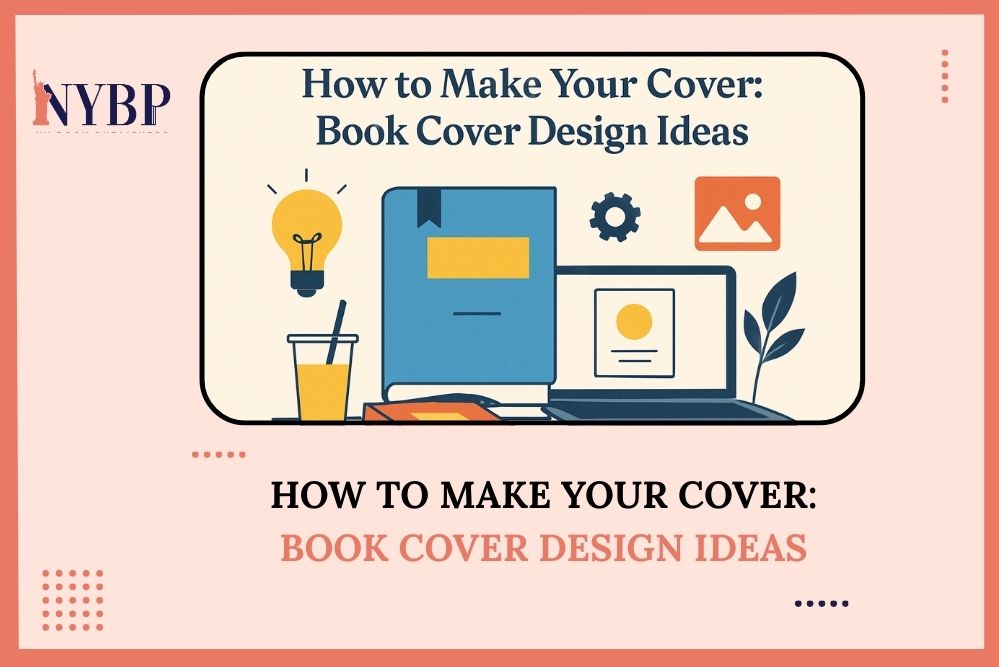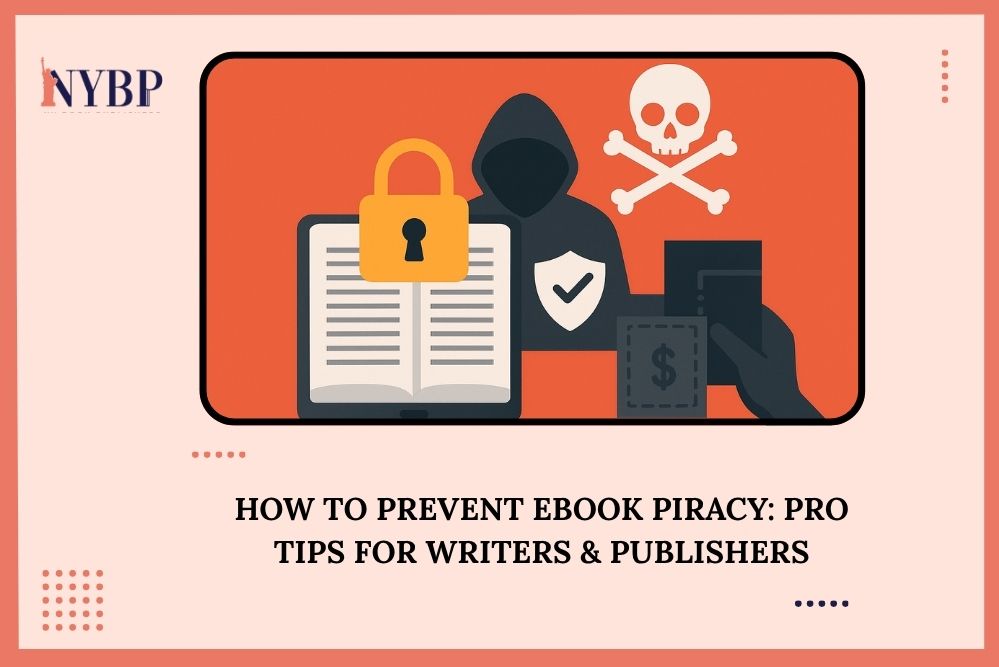Intro
Every writer dreams of seeing their name on a book cover. But many wonder how to get a book deal in the first place. A publishing deal can transform your manuscript into a real book, open doors to readers, and sometimes provide financial support. Yet, the journey from writing to signing a contract can seem confusing or even overwhelming. Many first-time authors aren’t sure where to start. They might finish a manuscript, but then hesitate because they don’t know how publishers select books, what contracts include, or how to pitch their work effectively. The good news is that with the right preparation and understanding of the publishing process, it’s entirely possible to land a book deal.
This guide breaks it down into 10 simple steps. Whether you’re an aspiring author with an idea or someone with a finished manuscript, you’ll learn how to navigate the world of publishing. By the end, you’ll know how to get a book publishing deal, what to expect from a publishing contract, and how to make your book stand out from the thousands of submissions publishers receive each year.
10 Proven Steps To Get A Book Deal Successfully!
Step 1: Understand What a Publishing Deal
Means
Before diving in, it’s crucial to know what a publishing deal is. Simply put, it’s a formal agreement between an author and a publisher. The publisher agrees to produce, distribute, and sometimes market your book. In return, the author receives royalties and sometimes an advance payment. Publishing deals vary greatly depending on the publisher, book genre, and author experience. Some deals cover the printing of hardcover, paperback, and digital editions. Others may include marketing support, public relations, and even assistance with book tours. Understanding these terms is vital, so you know what you’re agreeing to and can make informed decisions.
Knowing the ins and outs of publishing deals also helps you avoid common pitfalls. For example, some contracts may require you to give away certain rights, like audiobook or foreign language rights, without additional compensation. Being prepared ensures you protect your work while maximizing its reach and potential earnings.
Step 2: Polish Your Manuscript
Your manuscript is your key to a book deal. Publishers and agents often receive hundreds, if not thousands, of submissions. Only manuscripts that are polished, error-free, and compelling stand a chance of being considered. Start by carefully proofreading your work. Check for spelling mistakes, grammatical errors, and formatting issues. Consider hiring a professional book editor or using trusted beta readers to provide feedback. Fresh eyes can spot inconsistencies, plot holes, or sections that may confuse readers.
Additionally, a polished manuscript demonstrates professionalism. Publishers want to see that you take your work seriously. A messy or incomplete submission may suggest you’re not ready for the publishing world, even if your story has potential. Spending extra time refining your work can make the difference between rejection and landing a contract.
Step 3: Research Publishers and Agents
To learn how to get a publishing deal, you must research publishers and literary agents thoroughly. Some publishers accept direct submissions, while others require you to work through an agent. Knowing who accepts what can save you time and improve your chances. When researching, focus on publishers who specialize in your genre. Look at the books they’ve published recently, and see if your work would be a good fit. Check their submission guidelines carefully. Following instructions shows professionalism and attention to detail, qualities publishers value highly.
Agents can be particularly valuable because they know the industry inside out. They can advise on contracts, negotiate better deals, and connect you with publishers who are most likely to be interested in your work. Choosing the right agent or publisher is a crucial step in securing a deal.
Step 4: Write a Compelling Query Letter
A query letter is often your first impression on publishers or agents. Think of it as a short, persuasive introduction to your book and yourself. This letter can make or break your chances of getting a book publishing deal. Your query should include the book’s title, genre, word count, and a brief synopsis that hooks the reader. Highlight what makes your story unique or timely. Finally, include a short paragraph about yourself as an author, emphasizing experience, credentials, or notable achievements.
Avoid generic letters. Personalize each query for the specific publisher or agent. A well-crafted query letter can make your book stand out in a crowded inbox and increase your chances of moving forward in the process.
Step 5: Prepare a Strong Author Bio
Publishers want to know the person behind the manuscript. A strong author bio can make a significant difference when considering how to get a publishing deal for a book. Include relevant experience, previous publications, awards, or unique insights that relate to your book. Avoid unrelated personal details or controversial opinions. Keep it concise but professional, highlighting why you’re the best person to tell this story.
Your bio doesn’t have to be long. A few well-written sentences that show credibility, passion, and expertise are enough. Remember, your bio is often the first impression a publisher will have of you as an author.
Step 6: Learn How to Sell Your Manuscript
Selling your manuscript effectively is essential. Publishers and agents respond to writers who understand how to sell a manuscript. This means knowing your audience, market, and what makes your story unique. Start by researching similar books and understanding what worked for them. Show publishers that there is a demand for your genre and story. Include this knowledge in your query letter or proposal to demonstrate you are prepared and serious about the publishing business.
Building a small following online can also help. Publishers are increasingly interested in authors who already have an audience, even if small, because it indicates potential readers and marketing support.
Step 7: Submit and Track Submissions
Once your manuscript, query letter, and bio are ready, it’s time to submit. Follow each publisher’s or agent’s guidelines carefully. Some may prefer email, others online forms, and some even accept postal submissions.
Keep a detailed record of your submissions, including dates, contacts, and any responses. Tracking helps you follow up professionally and prevents duplicate submissions to the same contact. Remember, persistence is key. Many authors face multiple rejections before securing a deal. Staying organized reduces stress and keeps you focused on the next step.
Step 8: Understand the Contract
Receiving a publishing offer is exciting, but understanding the terms is crucial. A book deal is more than a signature on a page; it defines rights, royalties, advances, and responsibilities. Read contracts carefully. Understand your rights to print, digital, audiobook, or foreign editions. Make sure you know the royalty percentages, advance payments, and timelines for publication. Consulting a literary lawyer or agent is highly recommended to ensure you fully understand the agreement and avoid pitfalls.
A well-negotiated contract protects your work, income, and reputation. Don’t rush this stage. Taking the time to understand the deal can save major issues later.
Step 9: Negotiate if Necessary
Negotiation is a natural part of how to get a book contract. Publishers expect it, and it can significantly impact your book’s success. Common points for negotiation include advance amounts, royalty rates, rights, and marketing support. Approach negotiations respectfully and with knowledge of industry standards. Even small adjustments can have long-term benefits for both you and your publisher.
Confidence and preparation are key. Knowing your manuscript’s value, understanding market trends, and being professional during negotiation signals that you are a serious and informed author.
Step 10: Prepare for Publication
After signing the deal, your work isn’t done. Focus on final edits, book cover design, and marketing strategies. Collaborate with your publisher to ensure deadlines are met.
Be proactive in marketing. Offer input on cover design, participate in author interviews, and build your online presence. Engaging with readers early can increase visibility and sales. Publishing is a partnership. Your effort and enthusiasm will influence how successful your book becomes once it hits the market.
Extra Tips to Increase Your Chances
Even after following the 10 steps, there are additional actions that can significantly improve your odds of landing a book deal. These tips focus on networking, visibility, and ongoing improvement to make you a stronger candidate in the eyes of publishers.
1. Attend Literary Events and Build a Network
Literary events, book fairs, and writing conferences are excellent opportunities to meet other authors, literary agents, and publishers. These connections can provide valuable insights into the publishing process. Networking isn’t just about asking for a deal; it’s about learning, sharing experiences, and building relationships. Publishers often notice writers who are active in the literary community. Even a casual conversation at a workshop can lead to advice, introductions, or opportunities that might not be available online.
2. Build an Online Presence
Having an online presence can make a big difference when considering how to get a publishing deal for a book. Publishers want authors who already have a potential audience. Start by creating a website, blog, or social media profiles dedicated to your writing. Share excerpts, updates, and insights into your writing process. Engage with readers by responding to comments, joining discussions, or hosting virtual events. A strong online presence shows that you’re proactive and can help promote your book, which increases your appeal to publishers.
3. Understand Trends and Market Expectations
Understanding what’s trending in your genre can help you position your book more effectively. Publishers are looking for manuscripts that resonate with readers and fill gaps in the market. Read recent releases, bestsellers, and critically acclaimed works in your category. Notice common themes, styles, and what works in terms of pacing and storytelling. This doesn’t mean copying others; it’s about learning what readers enjoy and understanding how to make your manuscript stand out. Being well-read in your genre also allows you to speak confidently to publishers about your book’s relevance and potential audience.
4. Prepare Multiple Book Proposals to Maximize Opportunities
Having more than one proposal or manuscript ready increases your chances of securing a book publishing deal. Different publishers have different preferences, and what appeals to one may not appeal to another. Prepare detailed proposals for each manuscript, including synopsis, market research, target audience, and author bio. A well-organized proposal demonstrates professionalism and makes it easier for agents or publishers to evaluate your work quickly. By submitting multiple proposals, you maximize opportunities while learning what resonates best with the publishing market.
5. Keep Improving Your Manuscript
Even after finishing a manuscript, continuous improvement is crucial. Publishers are drawn to writers who show dedication and growth. Take workshops, attend writing courses, and seek feedback from trusted peers or mentors. Revise your work with a critical eye, focusing on plot, pacing, and character development. Continuous learning not only improves your current manuscript but also prepares you for future projects. Showing that you are committed to developing your craft signals to publishers that you’re serious about a long-term writing career.
By implementing these steps, you demonstrate to publishers that you are not only a talented writer but also someone who understands the business of publishing, engages with readers, and is committed to producing high-quality work consistently. These extra efforts can make the difference between a manuscript sitting on a shelf and securing a professional book deal.
Get Your Book Deal with NY Book Publishers
At NY Book Publishers, we make getting a book deal simple and stress-free. Our expert team can help you secure a publishing contract and ensure your book reaches the right audience. We don’t just write your manuscript, we also edit, design, and publish it with professionalism and care. Beyond that, we provide full marketing support, promoting your book across multiple platforms to maximize visibility and sales. With our network and expertise, your book can reach readers far and wide, often at competitive deals. Partnering with us means your story gets the attention it truly deserves.
Congratulations! A Great Book Deal Is Waiting For You!
Understanding how to get a book deal is about preparation, persistence, and strategy. Start by polishing your manuscript, researching publishers, creating strong queries, and learning how to negotiate contracts. A book deal is more than a contract; it’s your gateway to readers, credibility, and professional growth as an author. By following these 10 steps, you increase your chances of success while building confidence in your writing career. With patience, persistence, and dedication, your manuscript can move from your desk to bookshelves worldwide.
Frequently Asked Questions
What are the odds of getting a publishing deal?
It varies depending on manuscript quality, genre, and persistence. Strong manuscripts with research and professionalism have higher chances.
How much is the average book deal?
Advances typically range from $5,000 to $50,000. Royalties usually fall between 5–15% of sales, with bestsellers earning more.
What does a book deal mean?
It’s a formal agreement where a publisher prints, distributes, and sometimes markets your book in exchange for royalties or an advance payment.
What should I avoid in a bio?
Avoid unrelated personal details, political opinions, or overselling. Focus on achievements that show credibility and connection to your book’s topic.
How to get books cheaply?
Look for e-books, second-hand stores, library programs, or discounted digital editions offered by publishers. Many books are accessible at a low cost.






